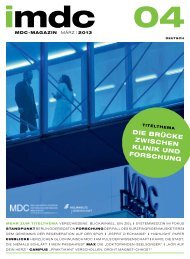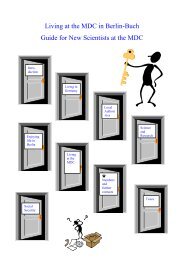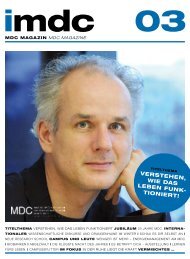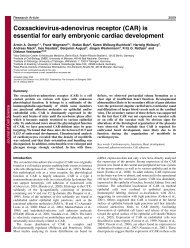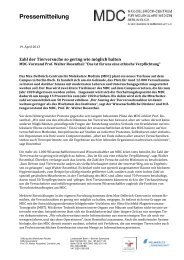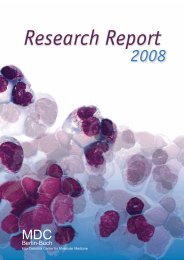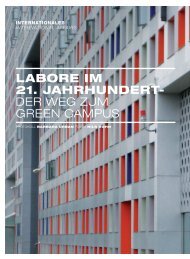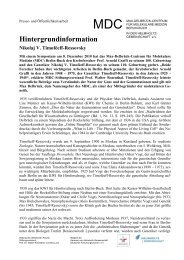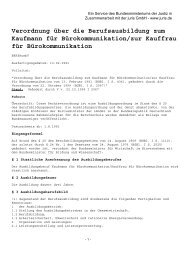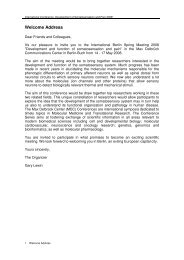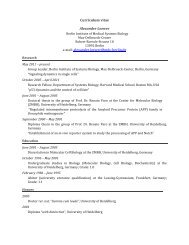iMDC03 zum Download (pdf)
iMDC03 zum Download (pdf)
iMDC03 zum Download (pdf)
Sie wollen auch ein ePaper? Erhöhen Sie die Reichweite Ihrer Titel.
YUMPU macht aus Druck-PDFs automatisch weboptimierte ePaper, die Google liebt.
international affairs<br />
38 imdc03 2012<br />
the Obelisk of technion, designed by<br />
architect and engineer, Dr Santiago Calatrava, was<br />
inaugurated at the Technion’s 85th anniversary<br />
celebration in 2009. The obelisk rises to a height<br />
of 28 meters.<br />
Photo: Oksana Seumenicht<br />
signGene<br />
New Research School at the MDC<br />
text barbara Urban<br />
tran s lation carOL ObErschmiDt<br />
The MDC has received funding for a new international<br />
PhD program – the German-Israeli Helmholtz Research<br />
School “Frontiers in Cell Signaling & Gene Regulation”<br />
or “SignGene” for short. The partners of the MDC in<br />
this Helmholtz Research School are the Technion – Israel<br />
Institute of Technology and the Hebrew University<br />
of Jerusalem (HUJI) as well as Humboldt-Universität zu<br />
Berlin and Charité – Universitätsmedizin Berlin.<br />
German-israeli collaboration<br />
When Professor Claus Scheidereit became Program Coordinator for Cancer Research<br />
at the MDC three years ago, the Management Committee (Leitungskollegium, GLK)<br />
proposed establishing an international research school for the cancer program.<br />
“Thomas Sommer suggested founding a research school together with Israeli partner<br />
institutions,” Scheidereit recalled. “That was the starting signal for SignGene!”<br />
Longstanding connections already existed between researchers in Haifa,<br />
Jerusalem, and Berlin. As a first step, scientists at all five partner institutions were<br />
surveyed concerning a concept for SignGene. They were asked to provide input both<br />
about existing cooperative projects and possible new projects in the future. The<br />
result was an impressive, dense network which would involve scientists from the<br />
Technion, HUJI, MDC, HUB and the Charité. As Professor Scheidereit pointed out,<br />
“What is so attractive about this network is that all of the partners complement<br />
each other. The MDC is very strong in molecular biology, molecular genetics and<br />
mouse models, but also in medical systems biology, a field in which we work closely



